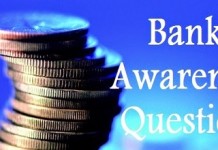Hello Aspirants. Welcome to Banking Awareness Quiz in AffairsCloud.com. Here we are creating quiz covering important questions which are common for all the bank exams and other competitive exams.
- A bond giving the investor the option to convert the bond into equity at a fixed conversion price is ________.
A. Coupon Bonds
B. Zero coupon Bond
C. Convertible Bond
D. None of theseC. Convertible Bond
Explanation:Convertible bonds are issued by corporations. Because they can be converted into a predetermined number of stock shares at certain points of the bond’s life. The investor typically gets a lower rate of return but can trade the bond for stock rather than be repaid the cost of the bond. - Which of the following appoints Banking ombudsman?
A. State Government
B. Union government
C. RBI
D. SBIC. RBI
Explanation:The Banking Ombudsman is appointed by the Reserve Bank of India to redress customer complaints against deficiency in certain banking services.The Banking Ombudsman Scheme enables an inexpensive forum to bank customers for resolution of complaints relating to certain services rendered by banks. - Treasury bills are issued by _________.
A. Commercial Banks
B. State government
C. EXIM Bank
D. RBID. RBI
Explanation:Treasury bills (T-bills) offer short-term investment opportunities, generally up to one year. They are thus useful in managing short-term liquidity. At present, the Government of India issues three types of treasury bills through auctions, namely, 91-day, 182-day and 364-day. There are no treasury bills issued by State Governments. - Which of the following does not include Priority Sector Lending?
A. Micro and Small Enterprises
B. Education
C. Housing
D. InsuranceD. Insurance
Explanation:Priority sector refers to those sectors of the economy which may not get timely and adequate credit in the absence of this special dispensation. These are small value loans to farmers for agriculture and allied activities, micro and small enterprises, poor people for housing, students for education and other low income groups and weaker sections. Priority Sector includes Agriculture, Micro and Small Enterprises, Education, Housing, Export Credit & Others. - CORE stand for _________.
A. Centre Online Real-time Exchange
B. Centralized Online Real-time Exchange
C. Computerised Online Real-time Exchange
D. Centralized Online Real-time ExportB. Centralized Online Real-time Exchange
Explanation:Centralized Online Real-time Exchange means that all the bank’s branches access applications from centralized data centers. The deposits made are reflected immediately on the bank’s servers and the customer can withdraw the deposited money from any of the bank’s branches throughout the world. These applications now also have the capability to address the needs of corporate customers, providing a comprehensive banking solution. - What is Multi city cheque?
A. Multi cheques paid
B. payable in any bank
C. payable in any branch of a particular bank
D. None of theseC. payable in any branch of a particular bank
Explanation:Multi City Cheque or MCC is a facility wherein the customer can issue cheques drawn at the base branch and payable at any branch at remote centre. - If you are taking a housing loan by depositing your house documents by mortgaging your house it is known as ________________.
A. Mortgage
B. Pledge
C. Collateral
D. None of theseB. Pledge
Explanation:A pledge is when the property is offered as collateral or security but that there isn’t an active lien on it. It is a right to reserve a legal interest in something. e.g. many banks and credit unions have what is called cross collateral So for instance, if you have a vehicle loan with a bank and also have a checking account with the bank, there is an excellent chance that you’ve signed a contract provision where you’ve pledged whatever funds you may have in your checking account from time to time as additional security on the loan. - Which of the following is not related to bill of exchange?
A. Endorser
B. Payee
C. Drawer
D. DraweeA. Endorser
Explanation:There are three entities that involved with a bill of exchange transaction. They are: Drawee. This party pays the amount stated on the bill of exchange to the payee. Drawer. This party requires the drawee to pay a third party (or the drawer can be paid by the drawee). Payee. This party is paid the amount specified on the bill of exchange by the drawee. - Coins in India are minted at
A. Noida
B. Kolkata
C. A & B
D. None of theseC. A & B
Explanation:There are four mints in India that produce coins for use of the public. These are: India Government Mint, Mumbai (Maharashtra), India Government Mint, Kolkata (West Bengal), India Government Mint, Hyderabad (Andhra Pradesh), India Government Mint, NOIDA (Uttar Pradesh). Apart from minting coins, the mints at Mumbai, Kolkata and Hyderabad also make coin blanks. - One percent of shareholding in NABARD is by
A. Union Government
B. RBI
C. NHB
D. None of theseB. RBI
Explanation:NABARD was established on 12 July 1982 by a special Act of parliament and its main focus was on upliftment of rural India by increasing the credit flow for elevation of agriculture & rural non farm sector.
AffairsCloud Recommends Oliveboard Mock Test
AffairsCloud Ebook - Support Us to Grow
Govt Jobs by Category
Bank Jobs Notification


